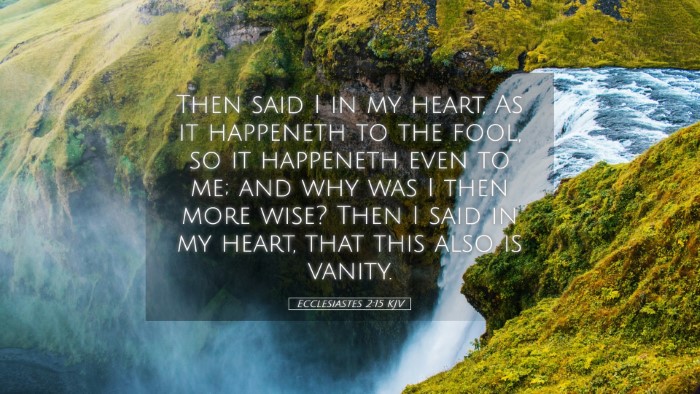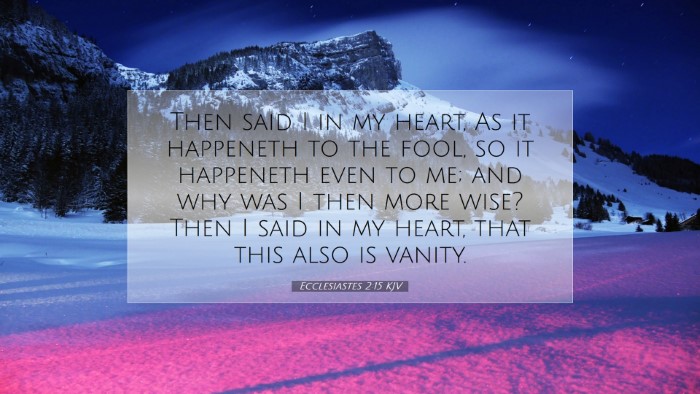Ecclesiastes 2:15 Commentary
Verse: "Then said I in my heart, As it happeneth to the fool, so it happeneth even to me; and why was I then more wise? Then I said in my heart, that this also is vanity."
Introduction
The book of Ecclesiastes offers profound insights into the human experience, particularly concerning the search for meaning and fulfillment. In Ecclesiastes 2:15, the author, traditionally Solomon, reflects on wisdom in contrast to folly, presenting a poignant commentary on the vanity of human endeavors.
Insights from Matthew Henry
Matthew Henry emphasizes the futility of trying to use wisdom to carve out a lasting identity or purpose in a transient world. He notes:
- Henry highlights that worldly wisdom does not prevent one from facing the same end as the fool, marking a level playing field in mortality.
- He discusses the cyclical nature of existence, underscoring that all struggles and labor may ultimately lead to the same end: death.
- Wisdom loses its allure when one contemplates the inevitability of death, leading to despair over human achievements.
Albert Barnes' Perspective
Albert Barnes offers a more analytical approach to the verse. He states:
- Barnes posits that Solomon’s struggle with the apparent equality of outcomes—between wise and foolish—leads him to question the value of wisdom itself.
- He elaborates that the wise man, despite his prudence, can meet the same fate as the fool, confronting the harsh reality that success and longevity do not correlate with wisdom.
- This realization drives Barnes to state that the conclusion drawn by the preacher implies all human endeavors, without a divine foundation, are ultimately in vain.
Adam Clarke's Interpretation
Adam Clarke's commentary brings forth a unique theological nuance:
- Clarke emphasizes the emotional weight carried by the writer; he sees the despair borne out of recognizing the futility of life's pursuits.
- His interpretation focuses on the phrase "why was I then more wise?" suggesting a moment of existential crisis where wisdom does not provide immunity from life's hardships.
- Clarke cautions readers about the dangers of relying on human insight as a primary means of navigating existence, pointing toward a need for divine wisdom as the true guiding light.
Theological Reflections
Combining the insights from these prominent commentaries, several theological reflections emerge:
- The Equality of Mortality: The realization that both the wise and the foolish meet the same inevitable end leads to questions about the value of wisdom in earthly terms.
- Vanity of Achievements: The pursuit of wisdom, riches, and other worldly goals can end up feeling hollow when faced with the finality of death.
- Call for Divine Wisdom: The commentary suggests a call to seek divine perspective and eternal purpose, rather than being swayed by temporal achievements.
- Existential Inquiry: The tension between meaning in earthly life and divine promise points to a deeper existential inquiry that resonates with modern believers.
Practical Applications
For pastors, students, theologians, and scholars, Ecclesiastes 2:15 serves as a rich text for teaching and reflection:
- Encouraging Humility: This verse encourages humility, teaching adherents that wisdom alone does not guarantee a favorable outcome in life.
- Promoting Eternal Perspective: The pursuit of wisdom should lead individuals to an eternal perspective, emphasizing the importance of aligning one’s heart with God’s will.
- Community and Support: Understanding life's futility can foster community as people share their struggles and joys, realizing that they are not alone in their quest for meaning.
- Preaching Hope: This passage becomes a foundational text for preachers to inspire hope in God’s providence amid the uncertainties of life.
Conclusion
In conclusion, Ecclesiastes 2:15 encapsulates the profound struggle between wisdom and the folly of human pursuits in a transient world. The commentaries from Henry, Barnes, and Clarke highlight a crucial truth: while wisdom is desirable, it ultimately finds its meaning only when viewed through the lens of an eternal and divine perspective. For present-day readers, this verse serves as both a caution against misplaced priorities and a call to seek a deeper relationship with God.


